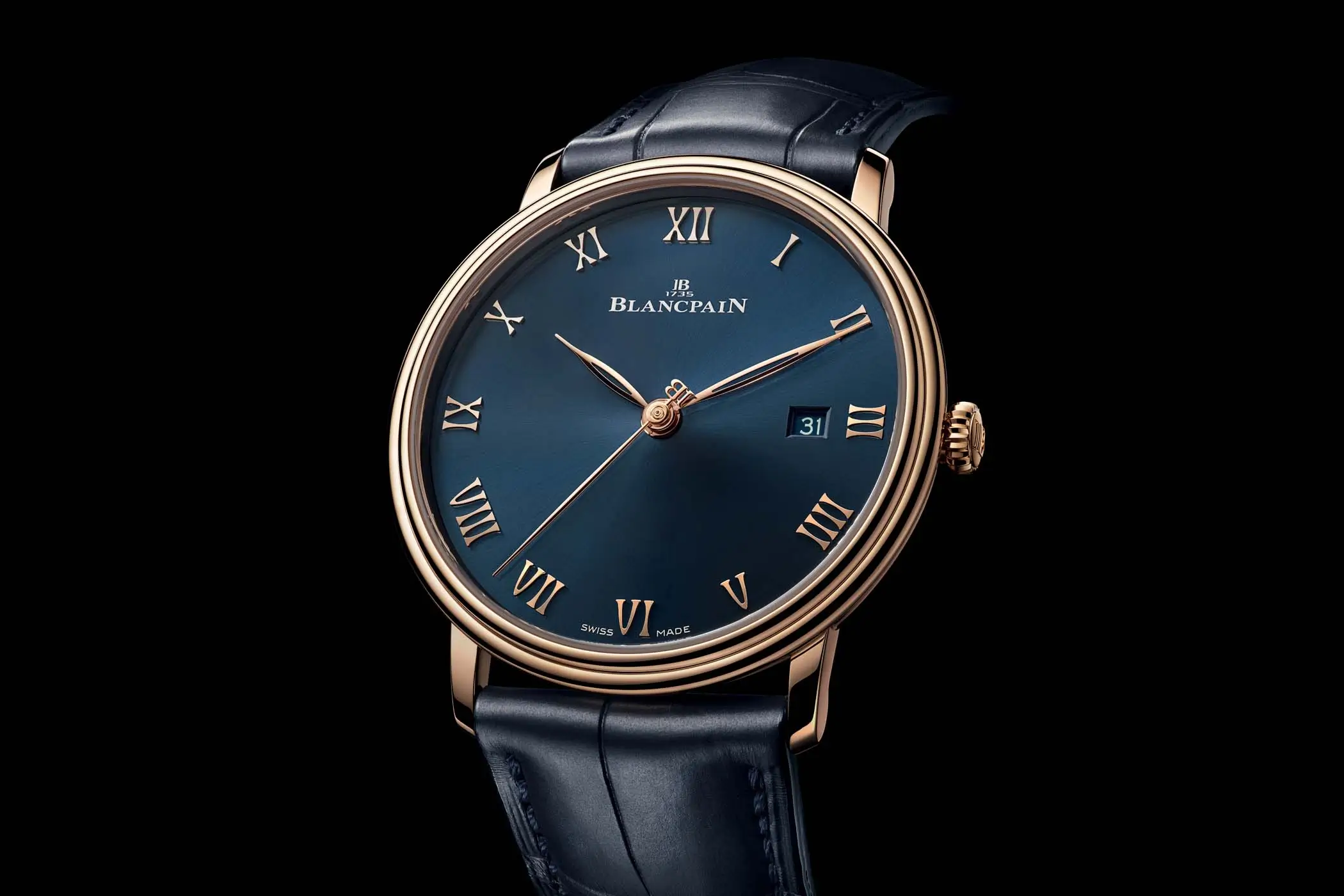Blancpain Company: Inside the World’s Oldest Watchmaking Brand
Watch Guides
2025-07-18Introduction
Blancpain, founded in 1735, is the world’s oldest watchmaking house and a pioneer of mechanical timekeeping. From its 18th‑century origins in Villeret to today’s status as a haute‑horlogerie icon, Blancpain’s heritage timeline charts groundbreaking innovations and enduring craftsmanship. In this deep dive, we’ll explore Blancpain history, trace the evolution of its most celebrated watches, and explain why Blancpain SA remains a leader in luxury horology. Finally, we’ll answer the key question: who owns Blancpain today?
The Origins of Blancpain Company
In 1735, Jehan‑Jacques Blancpain quietly inscribed his name in Villeret’s town register on May 10th, planting the first seed of what would grow into today’s Blancpain heritage. His rustic farmhouse workshop, nestled beneath the Jura Mountains, became a haven for meticulous handcraft:
- He reinforced the stone walls to cradle delicate balance wheels with unwavering stability.
- He repurposed old timber beams into bespoke workbenches, each scar and knot telling a story of craftsmanship.
- He enlarged a simple window, welcoming streams of natural light that danced across every polished brass gear.
Local merchants and village officials soon whispered of “those Blancpain watches”—timepieces renowned for their surprising precision and warm, heirloom quality. From forging balance springs by hearthlight to the final polish on each wheel, Jehan‑Jacques’s personal touch set the tone for the origins of Blancpain and defined the artisanal excellence that still drives Blancpain history today.
A Heritage Timeline: Evolution Since 1735
From its humble beginnings in 18th-century Switzerland to its role as a modern pioneer in haute horlogerie, Blancpain has evolved without ever compromising its roots. This Blancpain heritage timeline highlights the brand’s most defining moments—each milestone a reflection of craftsmanship, innovation, and enduring legacy. The timeline below offers a clear yet compelling look at how the world’s oldest watchmaker has shaped the art of horology since 1735.
1735 – Workshop Founded in Villeret
Jehan‑Jacques Blancpain converts his Villeret farmhouse into a watch workshop, officially registering the world’s oldest continuously operating watchmaker and laying the cornerstone of Blancpain history.
1815 – Transition to Industrial Production
As global demand for precision timepieces grows, Blancpain moves from the home atelier into a purpose‑built factory in Villeret—enabling standardized, small‑series production and shaping the early evolution of Blancpain watches.
1872 – Debut of High‑Precision Pocket‑Watch Calibers
Under Frédéric‑Louis Blancpain’s leadership, the brand introduces its first in‑house calibers with cutting‑edge escapements, establishing Blancpain as a pioneer in chronometric accuracy and mechanical complications.
1926 – Betty Family Acquisition & Women’s Wristwatches
Acquired by the Betty family, Blancpain launches its inaugural women’s wristwatch line, combining delicate Art Deco styling with robust Swiss movements—broadening its market and enriching its Blancpain heritage.
1953 – Fifty Fathoms: Birth of the Modern Dive Watch
Commissioned by French naval combat swimmers, the Fifty Fathoms debuts with a unidirectional rotating bezel, water‑resistant up to 50 fathoms—cementing Blancpain’s legacy in professional dive watch innovation.
1983 – Revival Under Jean‑Claude Biver & “Back to Tradition”
Jean‑Claude Biver rescues Blancpain from near‑extinction, relaunching the brand with a “Back to Tradition” campaign that emphasizes hand‑finished movements and classical design, reigniting global collector interest.
1992 – Swatch Group Acquisition & Formation of Blancpain SA
Joining the Swatch Group family, Blancpain SA is established, gaining access to advanced production facilities and R&D—accelerating the evolution of Blancpain watches across its luxury collections.
2007 – L‑Evolution Series Launch
Blancpain unveils the avant‑garde L‑Evolution line, featuring bold case architecture, sapphire dials, and in-house high‑frequency escapements—demonstrating how Blancpain balances tradition with modern design.
2020 – Ultra‑Complicated Tourbillons & Minute Repeaters
Showcased at Watches & Wonders Geneva, Blancpain releases record‑setting tourbillon and minute repeater masterpieces, complete with multi-axis carousels and cathedral gongs—underscoring its continued technical leadership.
2025 – Commitment to Sustainable Manufacture
Blancpain integrates eco‑friendly materials, solar‑powered R&D facilities, and zero‑waste production lines at Villeret, reflecting its dedication to environmental stewardship in haute horlogerie.
What Makes Blancpain the Oldest Watchmaking Company?
To claim the title of oldest watchmaking company, a brand must maintain continuous production from its founding. Unlike contemporaries that paused or shifted focus (often to purely quartz watches), Blancpain never ceased crafting mechanical movements. Today, Blancpain Company still hand‑assembles every movement, adhering to its founding ethos.
•Continuous heritage: No interruptions in mechanical watch production since 1735.
•In‑house movements: Every caliber is designed, produced, and tested under one roof.
•Collector trust: A Proven track record of quality sustains resale value.
Ownership & Structure: Who Owns Blancpain Watches?
In 1992, Blancpain SA joined the Swatch Group family. Under the umbrella of this conglomerate, Blancpain maintains full autonomy in design, R&D, and manufacturing.
•Blancpain SA: The legal entity overseeing all operations—research, production, and distribution.
•Swatch Group: Provides financial stability and global distribution channels without diluting Blancpain’s artisanal focus.
Signature Timepieces & Technical Innovations
Blancpain’s reputation rests on both its roots and its breakthroughs. Here are five iconic models:
1.Fifty Fathoms (1953) The first modern dive watch, water‑resistant to 50 fathoms (approx. 91 meters).
2.Villeret Ultra‑Thin (2014) Slim 3.6 mm movement—marvel of miniaturization.
3.L‑evolution (2007) Bold design marrying tradition with carbon fiber and sapphire bridges.
4.Le Brassus Tourbillon (2020) High‑complication tourbillon with minute repeater in a platinum case.
5.Fifty Fathoms Bathyscaphe Chronograph (2018) Modern reinterpretation, featuring in‑house flyback chronograph calibre.
Each model highlights Blancpain’s unwavering commitment to innovation—an extension of its Blancpain evolution since 1735.
Why Collectors Value Blancpain
Collectors prize Blancpain for three main reasons:
•Rarity: Limited‑edition runs amplify exclusivity.
•Craftsmanship: Hand‑finished bridges, Geneva stripes, and polished bevels.
•Investment potential: Historical models often appreciate over time.
By owning a Blancpain, you hold a piece of living history, a connection to centuries of Swiss watchmaking heritage.
Practical Buying Guide: Choosing Your First Blancpain Watch
Embarking on a Blancpain purchase requires strategy. Follow these steps:
1.Set Your Budget New watches typically start at $8,000. Pre‑owned market offers models from $5,000.
2.Decide on New vs. Pre‑Owned New: Full warranty and service history. Pre‑Owned: Better value; verify authenticity carefully.
3.Authenticate and Inspect Ask for full service records. Confirm serial numbers and hallmarks.
4.Ask the Right Questions Inquire about water‑resistance tests. Verify the movement’s service interval.
5.Where to Buy Authorized dealers for new pieces. Reputable secondary marketplaces (e.g., Chrono24, WatchBox).
Conclusion & Call to Action
Blancpain Company’s unparalleled legacy—from its 18th‑century beginnings to today’s high‑complication marvels—cements its place as the oldest watchmaking company. Whether you’re drawn to the historic blancpain history, the robust Blancpain heritage timeline, or the technical brilliance of modern collections, Blancpain offers a unique blend of tradition and innovation.


